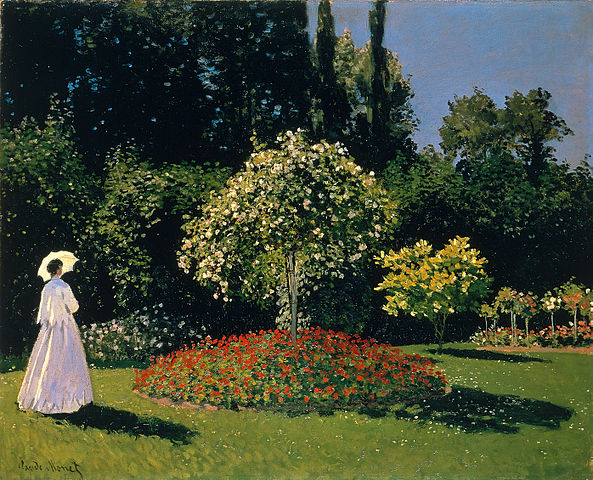A guest blog post by Jonathan Rowan
She waited for him in the garden . . . drawing on a pair of singularly fresh soft and elastic light gloves and presenting herself with a superficial readiness which, as he approached her over the small smooth lawn and in the watery English sunshine, he might, with his rougher preparation, have marked as the model for such an occasion. She had, this lady, a perfect plain propriety, an expensive subdued suitability, that her companion was not free to analyse, but that struck him, so that his consciousness of it was instantly acute, as a quality quite new to him. . . . What had come as straight to him as a ball in a well-played game—and caught moreover not less neatly—was just the air, in the person of his friend, of having seen and chosen, the air of achieved possession of those vague qualities and quantities that collectively figured to him as the advantage snatched from lucky chances. Without pomp or circumstance, certainly, as her original address to him, equally with his own response, had been, he would have sketched to himself his impression of her as: “Well, she’s more thoroughly civilized—!”
In this passage from the first chapter of Henry James’s novel The Ambassadors, Lambert Strether, a middle-aged American who has just arrived in Europe, enters the garden of his hotel in Chester, England, to meet his compatriot Maria Gostrey, who has been living in Europe for years and whose acquaintance he has made only an hour earlier. This novel is partly an exploration of what Europe can do for Americans—of the ways it can change them for the better—and here, in its first real scene, we see its hero already encountering one of the qualities his stay in Europe will give him: savoir-faire.
In the description of Miss Gostrey as presenting herself with a “superficial readiness,” the adjective is in no way pejorative; her readiness is superficial in that it pertains to her physical appearance. James is referring in this sentence to the ways his two characters have dressed themselves and otherwise prepared their appearances for the rendezvous, and so Miss Gostrey’s “superficial readiness” stands in contrast to Strether’s “rougher preparation.”
Miss Gostrey’s savoir-faire with regard to the elements of appearance—her “perfect plain propriety” and “expensive subdued suitability”—are “quite new” to Strether. This is an important point, for what we have in the encounter of the two characters is the encounter of two worlds—Europe and America. The social graces and refinements possessed by Miss Gostrey are something America lacks, and it is by way of her exposure to Europe that she possesses them. It is here that she has “seen and chosen” these “qualities and quantities”; she is a Europeanized American.
Later in this same chapter, James brings out the contrast between Miss Gostrey’s savoir-faire and Strether’s social greenness in an amusing exchange of business cards. Miss Gostrey gives Strether her card and returns for a moment to the hotel. During her absence, Strether puts the card in his pocket and, instead of waiting to take out his own until a moment when he is able to present it to her, he takes it out right away and stands there holding it. His companion, upon her return, wonders why on earth he is doing this and supposes that the card is her own:
It hadn’t been “Europe” at Liverpool…to the extent his present companion made it so. She hadn’t yet done that so much as when, after their walk had lasted a few minutes and he had had time to wonder if a couple of sidelong glances from her meant that he had best have put on gloves, she almost pulled him up with an amused challenge. “But why–fondly as it’s so easy to imagine your clinging to it–don’t you put it away? Or if it’s an inconvenience to you to carry it, one’s often glad to have one’s card back. The fortune one spends in them!”
Then he saw both that his way of marching with his own prepared tribute had affected her as a deviation in one of those directions that he couldn’t yet measure, and that she supposed this emblem to be still the one he had received from her.
This moment nicely points up the difference in social competence between the two characters. Miss Gostrey’s “complaint,” and the wry, ironic wit that adorns it, stem from her great social competence, her fine sense of behavioral elegance. That Strether is unequipped in this regard is shown not only by what he does with the card, but also by his amusing uncertainty, triggered by his companion’s glances, as to whether it would have been proper to don gloves, and by the characterization of his awkwardness as “a deviation in one of those directions that he couldn’t yet measure.” And Miss Gostrey’s savoir-faire is presented as characteristically European: Strether feels that he is experiencing “Europe.”
Strether will soon encounter an even more striking example of an American transformed by Europe: his fiancée’s son Chad, the very man he is in Europe to find. Will Strether follow through with his mission of persuading the young man to return home? And how will his stay in Europe transform him? If you’re interested in finding out, please join me for my seminar Metamorphosis of Americans in Europe: Henry James’s The Ambassadors at Toronto Pursuits 2016.
– Jonathan

